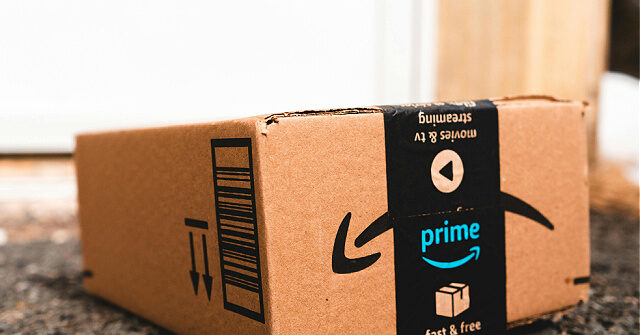Amazon’s big “Prime Day” sale runs from July 8 to 11 this year, arriving at the height of President Donald Trump’s tariff crusade.
A large number of Chinese resellers use Amazon, and they are reportedly nervous that Trump’s heavy tariffs on China could force their prices to be too high, making it easy for vendors in other countries to poach their customers.
Chinese imports were facing tariffs as high as 145 percent at one point, but after China made a deal in June that included more critical minerals exports, the rates came down to 30 percent. The Trump administration extended China’s exemption from a 25-percent tariff on computer chips until the end of August, and more deals are reportedly in the works.
Amazon seller Gloria Gu told the South China Morning Post (SCMP) on Wednesday that she is “not optimistic” about Prime Day this year because costs for the household items she sells have been pushed up ten
to 20 percent by tariffs.
“The market is still extremely cutthroat; we really can’t hike prices too much,” she said.
The director of the Eurasia Group’s China team, Wang Dan, told the SCMP that online platforms like Amazon have actually been somewhat insulated from the impact of tariffs so far.
“Many US bricks-and-mortar retailers, such as Walmart and Target, are being hit much harder by tariffs, but Amazon’s online supply chains remain largely intact. A lot of products from China that you can’t find in physical stores are still available online,” she said.
Prime Day this year begins one day before the deadline for many of the tariff waivers Trump issued in May, which could influence the pricing decisions of international sellers. Amazon actually rescheduled the big sale, extended it to four days instead of two, and launched some big discount deals early to work around the tariff waiver deadline.
Walmart and Target, two big brick-and-mortar retailers that also do a great deal of business online, moved their own summer sales events to compete with Amazon.
Some analysts predict all of these “Christmas in July” events will be impacted by tariff anxiety, although some think the sales might benefit from customers eager to buy ahead of the next big twist in the trade war saga. Then again, small and mid-sized sellers with tight profit margins might decide to sit Prime Day out altogether, especially those based in China.
MarketWatch quoted analysts who said Amazon extended Prime Day into a four-day shopping holiday this year, not because it was nervous about the tariff deadline, but because it saw tariff anxiety as an opportunity to pump up sales and take a bigger lead over the brick-and-mortar retail giants.
“Extending the savings window suggests that Amazon has greater retail logistics capacity to offer promotions, and that inventory availability is not a constraint, despite tariff concerns. Notable enablers include Amazon’s improved inbound network, optimized inventory placement, and recent robotics implementation,” said Bank of America analyst Justin Post.
U.S. media outlets tended to be more concerned with the impact of tariffs on Fourth of July fireworks than next week’s big Amazon sale. Outlets such as the New York Times (NYT), NBC News, Fox Business, and National Public Radio (NPR) ran stories over the past two days pointing out that China manufactures 99 percent of consumer fireworks and 90 percent of professional fireworks supplies, completely dominating the worldwide fireworks industry.
Trump exempted fireworks from the trade war with China during his first term in office, but not this time. Since fireworks are ordered months in advance of their biggest holiday in the United States, this year’s Fourth of July will not be affected very much by tariffs, beyond modest price increases and sporadic shortages. Some retailers complained about having to revise their prices several times this year due to tariff fluctuations, especially those who placed orders during the weeks when tariffs on Chinese imports stood at 145 percent.
“Small businesses ordered products at a certain price, then when the product was ready to ship, it was subject to an unexpected 20% tariff, or even worse, a 145% tariff. How can a small business make sound decisions when the tariff rate can just suddenly change overnight?” American Pyrotechnics Association executive director Julie Heckman complained to Fox Business.
Next year could be a different story if tariffs are still in effect, especially if they soar over 100 percent again, and July 4 next year will be America’s 250th birthday party. 2026 could be the biggest year ever for America’s $2 billion fireworks industry, or one of the worst years in memory. Heckman’s American Pyrotechnics Association and another industry group, the National Fireworks Association, are frantically lobbying the Trump administration and congressional representatives from both parties to obtain tariff relief for next year.
“John Adams envisioned that America’s independence should be commemorated with ‘pomp and parade, with shows, games, sports, guns, bells, bonfires and illuminations.’ An exemption for fireworks will allow businesses to continue with their plans to have enough affordable inventory for Americans to participate in and enjoy this historic occasion,” industry lobbyists wrote to Trump in April.
Read the full article here
